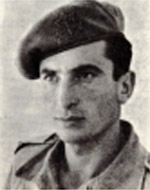Shraga, Israel
Son of Zalman and Bella. He was born on August 8, 2626 in Tarnopol, Poland. In his childhood, little is known except that he was a good student in the school where he studied, and especially – he excelled in the study of the Bible, and his classmate told him that he was thirsty for knowledge and would always ask and ask for an explanation from his teacher. And two years later, in 1941, his mother and two sisters were murdered by the Nazi oppressor (the father and another sister, Udim saved from fire, found refuge in the United States). Shraga found refuge in a small, narrow attic in Poland, in the home of a Christian family that gave him shelter. He was close to the partisans who adopted him and raised him with a paternal hand by doing them in the forests. After the war, Shraga moved to Germany and joined the Nili training program of the Gordonia movement and left Germany in 1946. Several times he boarded various illegal immigrant ships until he sailed on the illegal immigration ship “Chaim Arlosoroff.” But the ship was discovered by the British And he and several other young men jumped into the sea and put their faces on shore, but the time did not match them, and they were caught and loaded into a British warship that brought them to Cyprus, where Shraga remained until February 1948, when he was released from Cyprus. And from that day he did not stop his military service until his last day. Shraga underwent an officer’s course, joined the permanent army and reached the rank of lieutenant colonel. Among his other qualities are his coolness and courage. During combat operations, she would run from position to position without any fear, as if she were not under a shower of fire. During his military patrols, he would sometimes stand beneath him and marvel at the landscape of the country, to which he had been fond of love since childhood. But he did not spend much time here because his time was precious to him; he strove to carry out his duties diligently and diligently. He believed in his own way that he was right, and when he moved to fill a position in the General Staff, he worked diligently and did not want to be particularly conspicuous, for he was silent, self-contained, and disliked formality. Shraga was popular and honest, and every person was respected. Many knew how to turn to him in their distress, and there was no chance of greeting his friend. As a man of action he was full of realism and tried to accept the facts as they were. On the 15th of Adar 5723 (March 15, 1961) he fell while fulfilling his duties and was brought to eternal rest in the military cemetery in Kiryat Shaul. He left a wife and three children. His memory was mentioned in Uri Milstein’s book, “The Paratroop Wars.”
